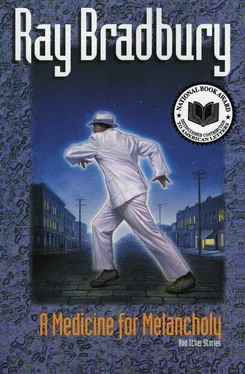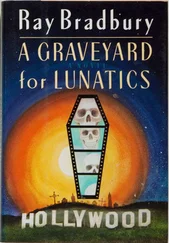“Doesn’t it scare you?”
“Can’t recall that it did much, Harry.”
“Idiots!”
“Now, Harry.”
Bittering wanted to cry. “You’ve got to work with me. If we stay here, we’ll all change. The air. Don’t you smell it? Something in the air. A Martian virus, maybe; some seed, or a pollen. Listen to me!”
They stared at him.
“Sam,” he said to one of them.
“Yes, Harry?”
“Will you help me build a rocket?”
“Harry, I got a whole load of metal and some blueprints. You want to work in my metal shop on a rocket, you’re welcome. I’ll sell you that metal for five hundred dollars. You should be able to construct a right pretty rocket, if you work alone, in about thirty years.”
Everyone laughed.
“Don’t laugh.”
Sam looked at him with quiet good humor.
“Sam,” Bittering said. “Your eyes—”
“What about them, Harry?”
“Didn’t they used to be gray?”
“Well now, I don’t remember.”
“They were, weren’t they?”
“Why do you ask, Harry?”
“Because now they’re kind of yellow-colored.”
“Is that so, Harry?” Sam said, casually.
“And you’re taller and thinner—”
“You might be right, Harry.”
“Sam, you shouldn’t have yellow eyes.”
“Harry, what color eyes have you got?” Sam said.
“My eyes? They’re blue, of course.”
“Here you are, Harry.” Sam handed him a pocket mirror. “Take a look at yourself.”
Mr. Bittering hesitated, and then raised the mirror to his face. There were little, very dim flecks of new gold captured in the blue of his eyes.
“Now look what you’ve done,” said Sam a moment later. “You’ve broken my mirror.”
Harry Bittering moved into the metal shop and began to build the rocket. Men stood in the open door and talked and joked without raising their voices. Once in a while they gave him a hand on lifting something. But mostly they just idled and watched him with their yellowing eyes.
“It’s suppertime, Harry,” they said.
His wife appeared with his supper in a wicker basket.
“I won’t touch it,” he said. “I’ll eat only food from our Deepfreeze. Food that came from Earth. Nothing from our garden.”
His wife stood watching him. “You can’t build a rocket.”
“I worked in a shop once, when I was twenty. I know metal. Once I get it started, the others will help,” he said, not looking at her, laying out the blueprints.
“Harry, Harry,” she said, helplessly.
“We’ve got to get away, Cora. We’ve got to!”
The nights were full of wind that blew down the empty moonlit sea meadows past the little white chess cities lying for their twelve-thousandth year in the shallows. In the Earthmen’s settlement, the Bittering house shook with a feeling of change.
Lying abed, Mr. Bittering felt his bones shifted, shaped, melted like gold. His wife, lying beside him, was dark from many sunny afternoons. Dark she was, and golden-eyed, burnt almost black by the sun, sleeping, and the children metallic in their beds, and the wind roaring forlorn and changing through the old peach trees, the violet grass, shaking out green rose petals.
The fear would not be stopped. It had his throat and heart. It dripped in a wetness of the arm and the temple and the trembling palm.
A green star rose in the east.
A strange word emerged from Mr. Bittering’s lips.
“ Iorrt. Iorrt .” He repeated it.
It was a Martian word. He knew no Martian.
In the middle of the night he arose and dialed a call through to Simpson, the archaeologist.
“Simpson, what does the word Iorrt mean?”
“Why that’s the old Martian word for our planet Earth. Why?”
“No special reason.”
The telephone slipped from his hand.
“Hello, hello, hello, hello,” it kept saying while he sat gazing out at the green star. “Bittering? Harry, are you there?”
The days were full of metal sound. He laid the frame of the rocket with the reluctant help of three indifferent men. He grew very tired in an hour or so and had to sit down.
“The altitude,” laughed a man.
“Are you eating , Harry?” asked another.
“I’m eating,” he said, angrily.
“From your Deepfreeze?”
“Yes!”
“You’re getting thinner, Harry.”
“I’m not!”
“And taller.”
“Liar!”
His wife took him aside a few days later. “Harry, I’ve used up all the food in the Deepfreeze. There’s nothing left. I’ll have to make sandwiches using food grown on Mars.”
He sat down heavily.
“You must eat,” she said. “You’re weak.”
“Yes,” he said.
He took a sandwich, opened it, looked at it, and began to nibble at it.
“And take the rest of the day off,” she said. “It’s hot. The children want to swim in the canals and hike. Please come along.”
“I can’t waste time. This is a crisis!”
“Just for an hour,” she urged. “A swim’ll do you good.”
He rose, sweating. “All right, all right. Leave me alone. I’ll come.”
“Good for you, Harry.”
The sun was hot, the day quiet. There was only an immense staring burn upon the land. They moved along the canal, the father, the mother, the racing children in their swimsuits. They stopped and ate meat sandwiches. He saw their skin baking brown. And he saw the yellow eyes of his wife and his children, their eyes that were never yellow before. A few tremblings shook him, but were carried off in waves of pleasant heat as he lay in the sun. He was too tired to be afraid.
“Cora, how long have your eyes been yellow?”
She was bewildered. “Always, I guess.”
“They didn’t change from brown in the last three months?”
She bit her lips. “No. Why do you ask?”
“Never mind.”
They sat there.
“The children’s eyes,” he said. “They’re yellow, too.”
“Sometimes growing children’s eyes change color.”
“Maybe we’re children, too. At least to Mars. That’s a thought.” He laughed. “Think I’ll swim.”
They leaped into the canal water, and he let himself sink down and down to the bottom like a golden statue and lie there in green silence. All was water-quiet and deep, all was peace. He felt the steady, slow current drift him easily.
If I lie here long enough, he thought, the water will work and eat away my flesh until the bones show like coral. Just my skeleton left. And then the water can build on that skeleton—green things, deep water things, red things, yellow things. Change. Change. Slow, deep, silent change. And isn’t that what it is up there?
He saw the sky submerged above him, the sun made Martian by atmosphere and time and space.
Up there, a big river, he thought, a Martian river; all of us lying deep in it, in our pebble houses, in our sunken boulder houses, like crayfish hidden, and the water washing away our old bodies and lengthening the bones and—
He let himself drift up through the soft light.
Dan sat on the edge of the canal, regarding his father seriously.
“ Utha ,” he said.
“What?” asked his father.
The boy smiled. “You know. Utha ’s the Martian word for ‘father.’”
“Where did you learn it?”
“I don’t know. Around. Utha! ”
“What do you want?”
The boy hesitated. “I—I want to change my name.”
“Change it?”
“Yes.”
His mother swam over. “What’s wrong with Dan for a name?”
Dan fidgeted. “The other day you called Dan, Dan, Dan. I didn’t even hear. I said to myself, That’s not my name. I’ve a new name I want to use.”
Читать дальше












